Anthony Weiner: Behind the scenes of a political marriage
- Published
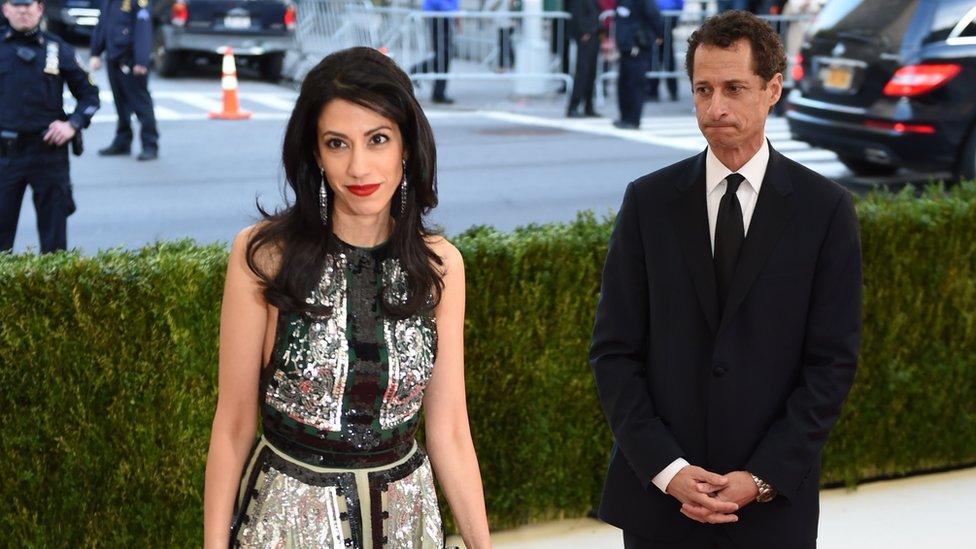
In a new film about former congressman Anthony Weiner, wife Huma Abedin stands out
A new documentary, Weiner, looks at the failed New York City mayoral candidacy of former congressman Anthony Weiner. But his wife, Huma Abedin, one of Hillary Clinton's closest aides, steals the show.
Before the release of their new documentary, Weiner, filmmakers Josh Kriegman and Elyse Steinberg told me that they'd asked their husband and wife protagonists if they wanted to see the documentary.
Both Weiner and Abedin turned down the offer. It's not hard to figure out why.
For one thing, Abedin is working on Clinton's presidential campaign, and they're trying to beat the Republican candidate, Donald Trump, in November.
Then there are more obvious reasons.
The documentary tells the story of Abedin's husband, Anthony Weiner. He resigned from the US congress in 2011 because of a sexting scandal and then ran for mayor of New York City.
During the 2013 mayoral campaign, he's again caught fooling around with women he meets online. The film traces the trajectory of the political campaign and also what happens to him at home.
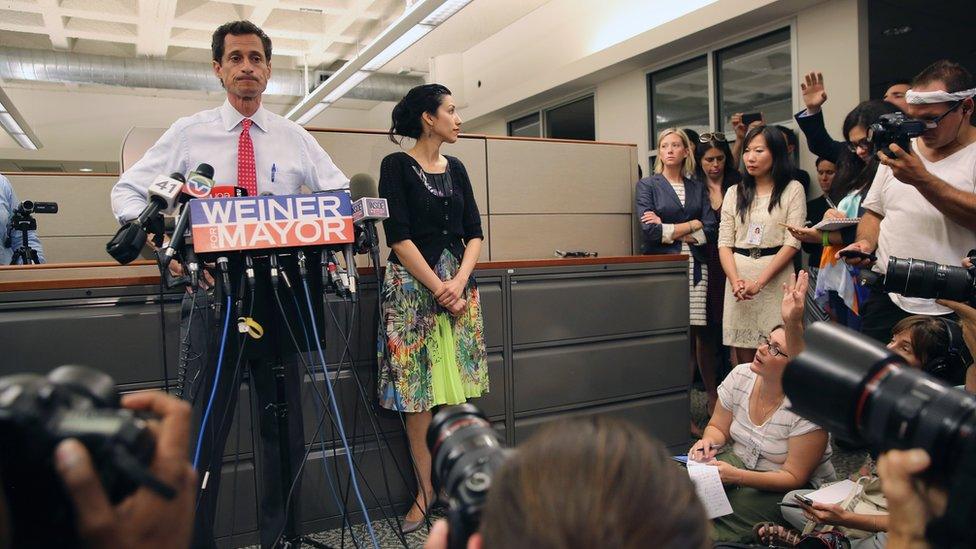
The press conference where Weiner admits he was involved in another sexting scandal
The marriage survives. But Abedin's role changes. She goes from being a devoted wife to someone who places her bets, at least politically, on Clinton - not her husband.
The metamorphosis of Abedin from a committed wife to a cautious one, hedging her bets, takes place gradually during the film. It's expressed in a subtle manner - more through gestures than words.
In a political ad that's shown early in the film, she smiles at her husband while he talks about his candidacy for mayor.
Later at an event in a New York apartment, she stands up and says: "I'm usually in that room as far as possible from the microphone." Then she makes the case for why New Yorkers should vote for her husband.
Lots of people are convinced - in the beginning. The campaign headquarters are filled with volunteers. A "Team Weiner" sign, written in colourful markers, hangs on the wall.
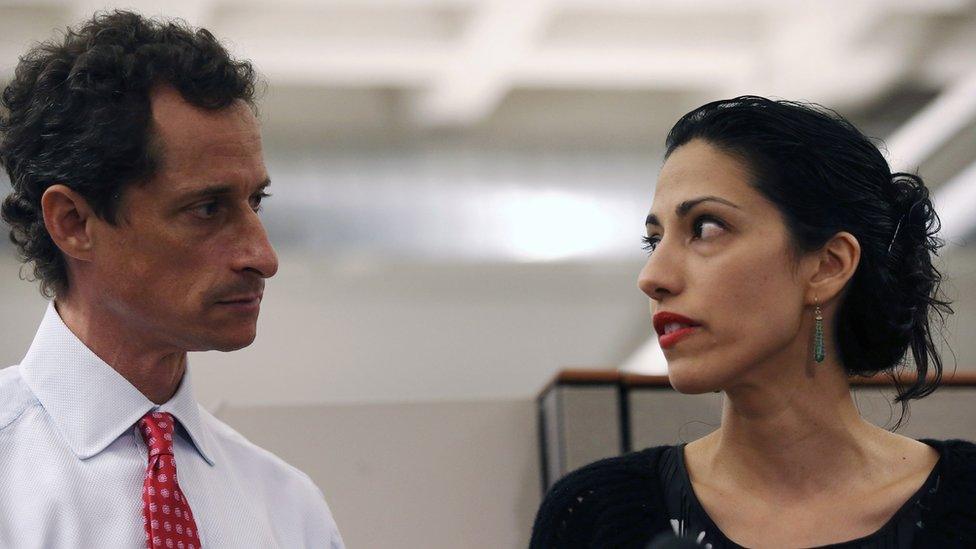
Abedin's role in the campaign - and the film - evolves as the fallout from his behaviour continues
Weiner is skinny and wiry - a coiled fury. He also has Faustian appetites.
Sitting in a car, he eats a meal out of a plastic container. When he's done, he holds up the container and pours crumbs into his mouth. He gets all of them.
When the scandal breaks, he and his wife are shown together in their apartment, talking with staff and volunteers about the crisis.
He's slouched on a couch. She's standing on the side of the room, with her arms crossed.
"The level of guilt," he says and puts his hand on his heart.
She practically rolls her eyes - and leaves the room.
He knows his performance - the one in which he expresses regret for his actions - needs work. He practises his lines.
"I am profoundly sorry," he says, standing in a room and holding his hand over his heart. He says it three times. Then he says it on camera.
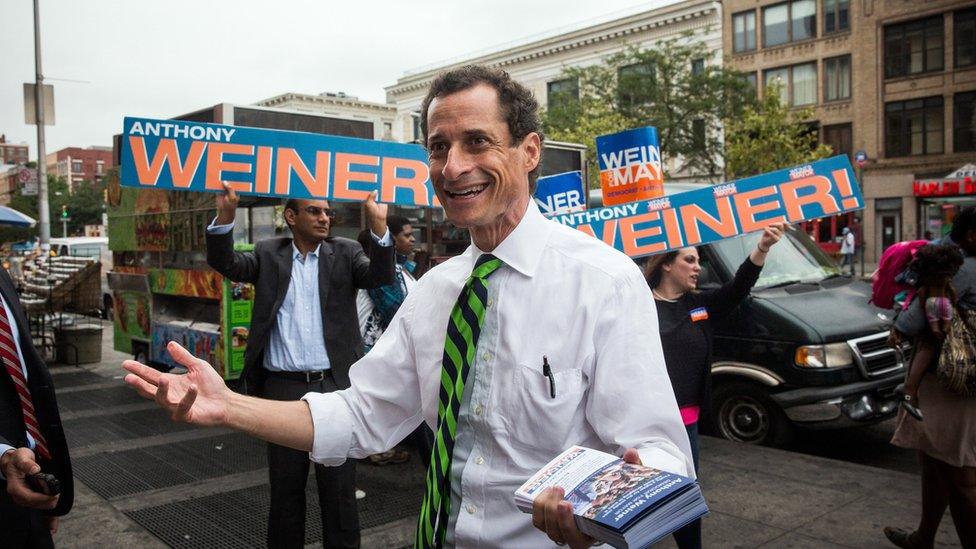
Weiner continued his mayoral campaign even after the second scandal
In another scene, Abedin stands near him while he talks on the phone about the scandal.
She shakes her head and taps her nails on the desk. Then she walks near him and claps her hands - once, sharply. It sounds like a peal of thunder.
He looks out the window. Then he asks the filmmakers to leave the room.
It's an emotionally charged, intimate moment in a political marriage, caught on camera. It shows the feelings they have for each other, expressed without words, and also how the dynamic in their marriage shifts.
She loves him, but the scandal has pushed her almost to a breaking point.
Later he says he wants her to go with him to the polls on election day to show her support for his candidacy.
While he talks, she's standing in a dark hallway with her arms crossed.
One of Clinton's advisors, Philippe Reines, who served as a spokesman when Clinton was secretary of state, appears as a dark force in the film - unseen but powerful.
Reines wants Abedin to stay away from her husband during a key moment in his mayoral campaign. Apparently he thinks it could damage her reputation.
She listens to Reines - not her husband.
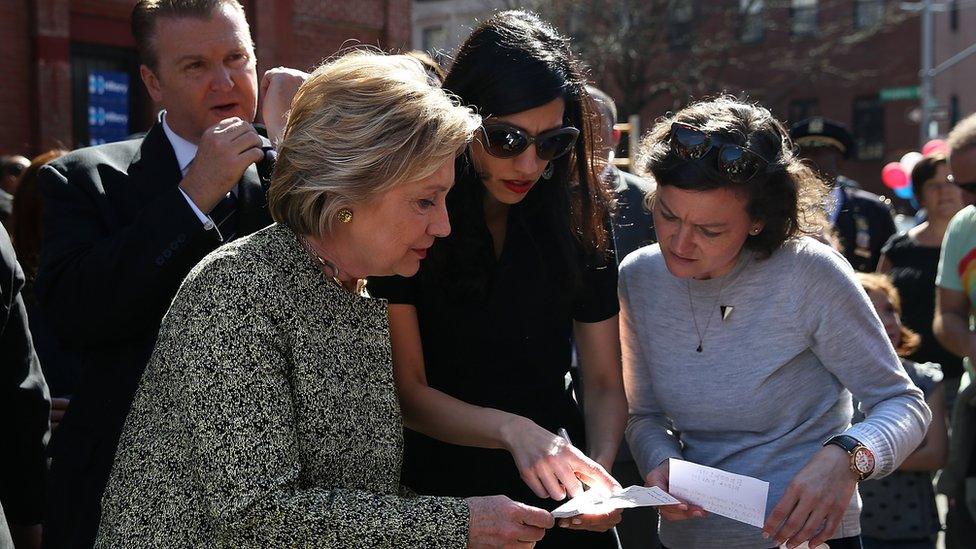
Abedin has long been one of Hillary Clinton's most trusted aides
Weiner was committed to politics. But he became a punchline.
His underwear is paraded on stage during a comedy routine. In another scene a man and a woman re-enact one of the hot-chats he has online, reading from messages he sent, as an audience roars with laughter.
About a week before the film opened in Washington, Kriegman told me he'd tried to capture the spectacle of politics, an aspect Trump has ramped up.
"There's a kind of theatrics to it all," Kriegman said. "If you know how to play it, you can be influential."
Weiner thought he could play the crowd. But he got only 5% of the Democratic primary vote in the mayoral race.
In the end his wife distanced herself from his campaign. She didn't go with him to the polls on election day.
She's now in the midst of a close presidential race and seems to be doing OK. But he doesn't seem to have many options, at least not in politics.
The film shows that in political theatre, sometimes it's smart to stay off stage. Grandstanders get attention and glory, but they don't always last.
Weiner (Sundance Selects) will be released in Washington and other US cities on 27 May.